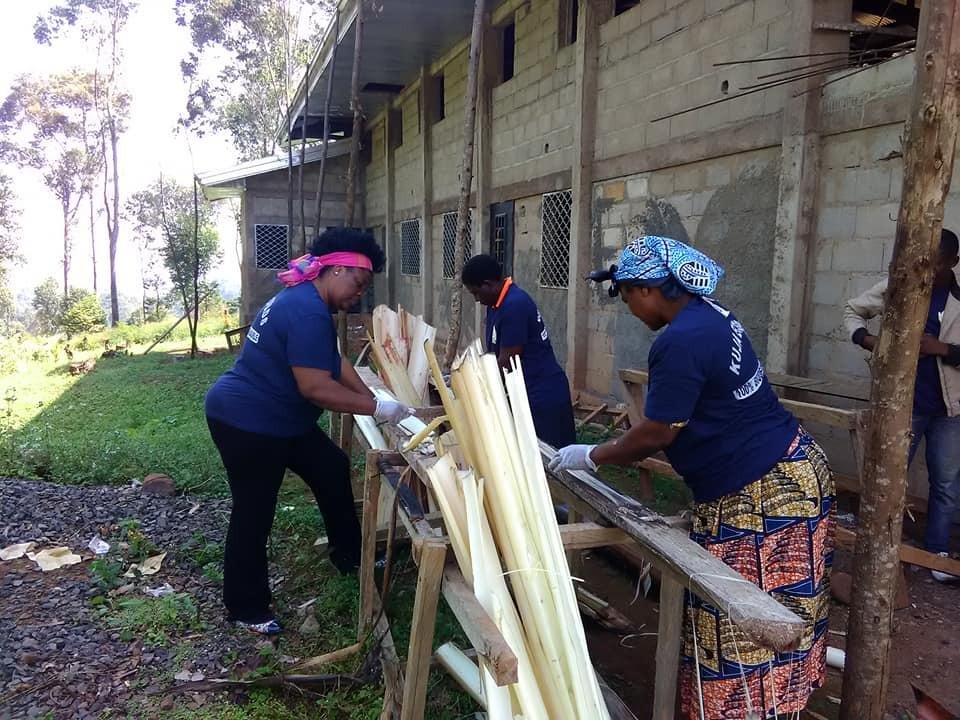Meet the activist breaking Cameroon’s period taboo with eco-friendly pads

Marie-Claire Kuja is the founder of KujaEcoPads, an initiative with a mission to end period poverty in Cameroon by producing eco-friendly, affordable and accessible sanitary pads. Here she tells us about period shame and her new One Million Girls campaign.
Imagine dropping out of school, not being able to cook or work, being forced to marry at an early age – just because you menstruate. This is the reality for millions of girls and women around the world who lack access to toilets, clean water and hygienic menstrual products, and therefore don’t know how to effectively manage their periods.
According to UNESCO, one in ten girls in Africa miss school because of period poverty, the equivalent to 20% of the school year. They are also exposed to negative social stigma and significant health issues, exacerbating their vulnerabilities.
“I grew up in Cameroon, in a very small village. And prior to having my period, I didn’t have sanitary pads to use or the appropriate knowledge about menstruation. I fumbled a lot using rags, which caused a lot of infections and rashes,” says Marie-Claire Kuja, a nurse by profession. “I had a family who saw the potential in me and sent me to school. There I realised that many girls were facing the same problems. There was a ‘black sweater syndrome’: girls who commenced menstruating always went to school with a black sweater to tie around with them, to hide the blood stains. Because what they were using was still really the best they had.”
Years later, things haven’t changed much, Kuja explains. “Girls skip three to five days of school a month, and eventually drop out, which perpetuates a cycle of early forced marriages, early pregnancies, prostitution, illiteracy, poverty and shame. Women are isolated and treated like dirt: they cannot cook, or sleep in the same bed with their husbands when they have their periods. Some are kept in huts for three to five days a month. This shouldn’t happen.”
An eco-friendly and sustainable solution to end period poverty
When Kuja earned a scholarship to study in the US, she realised things were different there. “There were affordable sanitary pads and all sorts of brands in stores. Menstruation was not a taboo subject to talk about. So I started questioning why it is one in Africa. That question stuck in my mind for so many years.”
Inspired by her own experience, Kuja spent years relentlessly researching and experimenting with how she could tackle period poverty in her country. She first launched an initiative that involved sending pads from New York and donating them to girls in Cameroon. “Although many girls benefited from the project, it wasn’t sustainable. The cost of shipping pads from the West, like America or Europe, to Cameroon was quite overwhelming. So we stopped, and I decided to do some more research.”

After a few years, she came up with an innovative idea: creating sanitary pads from banana stems.
“I found out that mainstream disposable pads are made from 90% plastic and other chemicals, which is a hazard to the environment and to women’s health as well. I really didn’t want to bring that to women who were already vulnerable. So I continued my research, and finally discovered that in the 18th century, Japanese women used a cloth made of banana stems to hold menstrual blood. They would also use them as wipes for babies. I had it tested in labs and it turned out that it absorbs eight times more than a regular menstruating product, – and it’s natural. That was a very big moment for me.”
It took Kuja two years of saving to be able to buy a machine to produce affordable pads. “It wasn’t easy because the sanitary napkins market is a billion dollar business and the machines are very expensive. But I was fortunate that someone recommended the Indian entrepreneur the Indian entrepreneur Arunachalam Muruganantham, known as the ‘Menstrual Man’. He is the first person in the world to manufacture machines that produce low cost sanitary pads for women.’
After acquiring her first machine, Kuja started training and recruiting women to produce the KujaEcoPads, a 100% biodegradable sanitary pad made from the fibres extracted from the waste of banana stems. Now entering their fifth year, Kuja wants to make her pads affordable and accessible to all. “We sell our pads through NGOs, who donate them to girls and women in the communities where they operate. We use vendors, like wholesalers, supermarkets and pharmacies. We also trained women entrepreneurs on how to reach different communities going to schools, churches and women’s groups.”

‘Every girl matters’: Supporting refugees
Since 2012, Cameroon has seen huge influxes of people from bordering countries, particularly the Central African Republic and Nigeria. In December 2020 alone, approximately 6,700 refugees from the Central African Republic fled into the country following violence around the general elections. Displacement poses a serious problem in terms of access to resources and basic necessities such as clean water, hygiene and sanitation, and particularly affects women’s and girls’ education and health.
To support refugees and internally displaced women, Kuja is launching the One Million Girls campaign, partnering with NGOs to manufacture and distribute eco-friendly sanitary pads to one million girls in Cameroon and the neighbouring Democratic Republic of Congo. Each girl will receive a year’s supply of sanitary napkins and training in menstrual hygiene management.
“Refugee girls and women in camps usually don’t have clean, running water. So if you give them reusable pads or washable cloths, they won’t be able to use them due to a lack of water. Also, most refugee women and girls are on the move, running away from crisis, from violence. They don’t have the money to buy pads. They don’t have the luxury of washing reusable cloths, sterilising them and drying them. Sometimes they don’t even have soap. With disposable pads, they only have to wrap them in a bag and throw them away.”
Breaking the menstrual taboo
For Kuja, ending period poverty is more than just making and distributing affordable pads: it’s also about shifting mentalities and stopping period shame. “We have educated more than one million school girls in two regions on menstrual hygiene management best practices, because no matter how many pads you give them, if you don’t do something to change their mentality and behaviours, the taboos, myths and stigma around menstruation will persist.
“There are many girls who have lost themselves, who have lost their positions in the world because of menstruation. Society needs to know that menstruation is a natural, biological process. So we have trained them: we have curriculums that we distribute at different schools, women’s groups and communities to create this awareness.”

Although having a period is a natural and healthy part of a woman’s reproductive health, the stigma surrounding it is universal: most girls and women around the world are left ignorant and scared of menstruation. According to the humanitarian agency CARE International, the taboo and the invisibility of periods persists in Western countries too: 40% of American women were afraid during their first period because of a lack of information on the subject, and half of French women still feel shame when they are menstruating.
“I think that, in Cameroon, the taboo originally started because if periods are not well taken care of from the beginning, they smell. Women were not managing them properly, and they were hiding it. And because our ancestors were not educated about menstruation, they looked at it as being dirty. But it shouldn’t be that way anymore. Education should teach women that they have to change regularly.
“We have some pads on the market labelled as lasting eight to 12 hours – that’s deceitful. Because how long your pads will last, it’s not how long my pads will last. We all bleed differently. Your flow is different from my own. Women should change as many times as they feel the need to. I think that this lack of education makes women in many communities feel dirty.”
“We don’t have to treat women as impure and dirty because they menstruate. We all came to the world because of menstruation. Because a woman, somewhere, had menstruation and ovulation, and then conceived us and gave birth to us. Menstruation should be treated with a lot of love and care.”
Alia Chebbab

READ MORE:

3 thoughts on “Meet the activist breaking Cameroon’s period taboo with eco-friendly pads”